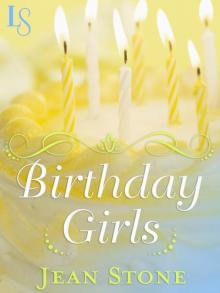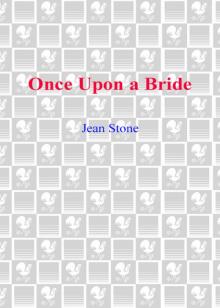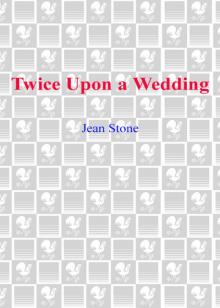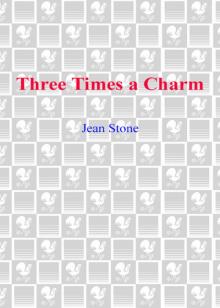- Home
- Jean Stone
Four Steps to the Altar
Four Steps to the Altar Read online
Contents
Title Page
Dedication
Chapter 1
Chapter 2
Chapter 3
Chapter 4
Chapter 5
Chapter 6
Chapter 7
Chapter 8
Chapter 9
Chapter 10
Chapter 11
Chapter 12
Chapter 13
Chapter 14
Chapter 15
Chapter 16
Chapter 17
Chapter 18
Chapter 19
Chapter 20
Chapter 21
Chapter 22
Chapter 23
Chapter 24
Chapter 25
Chapter 26
Chapter 27
Chapter 28
Chapter 29
Chapter 30
Chapter 31
Chapter 32
Chapter 33
Chapter 34
Chapter 35
Chapter 36
Chapter 37
Chapter 38
Chapter 39
Chapter 40
Chapter 41
Epilogue
About the Author
Other Books by Jean Stone
Copyright Page
TO WENDY,
WITH THANKS
1
Marry me, Lily.”
It was early in May, a year when spring had come deliciously early to the Berkshire hills of Massachusetts, teasing the landscape with purple crocus and yellow daffodils, plumping tree branches with expectant buds, warming the earth with the promise of a new season, another chance at another beginning.
It was early in May, and it was the end of the day, the end of another wedding that Lily and her second-wedding-planning partners had created, this one a Sunday evening event between a nurse and a carpenter who lived in Albany and had met at a school play when their kids were in first grade. It was a second wedding for the nurse, a third for the carpenter.
If Lily Beckwith married Frank Forbes, it would be his second, her fourth, which wouldn’t matter, because hardly anyone got married only once anymore.
Still, she would have to say no.
She zipped the quilted case that held the silver hors d’oeuvre trays they’d used for the crab cakes and spinach quiches. She moved it to the stack of things that Frank had offered to load into his truck and return from the reception at the country club to the rental store. He was generous like that. Always around to help the small bunch of enthusiastic women who took on too much work because it was such fun.
“Frank,” Lily said softly, “I don’t know what to say.” She’d known him a year, well, less than that, actually, since she’d come back to West Hope, where she and her old college roommates had opened Second Chances, proclaiming themselves the be-all, end-all, know-it-all experts for second-time brides. They’d leased a shop in Frank’s building on Main Street, and Lily had moved into the apartment upstairs. Because Frank was a man, and because he was single, it was inevitable that Lily quickly had snared him. It was also inevitable, she supposed, that he now felt secure in popping the question. She should have expected it, should have been prepared. Instead, she lowered her eyes. “Will you let me think about it?”
He laughed good-naturedly. “We can do a prenup. I’ll keep my meager antiques business, you keep your late husband’s vast fortune.”
He was trying to lighten the mood, Lily thought. He had no idea things would not be that easy. She shook her head. “But I’ve already been married a few times.”
“I don’t care if you’ve had a few hundred husbands. I’d like to be the few hundred and first.”
He was a dear man, Frank Forbes. He was gentle, kind, steady, and strong. He was good-enough-looking, not too short or too tall, not dashingly handsome, but he had sturdy, broad shoulders and sincere brown eyes and a sweet, receding hairline. He’d make a great husband, partner, mate. And he loved her! Lily had felt sure of that from the start.
“You do love me, Lily,” he said, taking her hand, his callused, workingman fingers threading around her soft, delicate ones, smothering her large pear-shaped pink diamond, the ring she’d bought one day on a whim.
It was the pink diamond—not the previous marriages—that was the real problem.
If Lily married Frank—or anyone—she would lose her inheritance from poor, dead Reginald Beckwith, her most recent husband. As much as Lily cared about Frank, would he—would any man—really be worth fifty million? Not that she’d ever see the cash, certainly not the way Reginald’s beastly sister, Antonia, rationed Lily’s allowance as if it were chocolate and Lily, a diabetic.
Fluffing her wispy blond curls, Lily resumed her role as a coquette. “Don’t be a goose, darling. I simply need a bit of time. You understand, don’t you?” She stood on her tiptoes and kissed his forehead. “Now, I must go check on the girls.” Then she flitted away, butterfly that she was, too embarrassed to admit to Frank that, short of going to Antonia and distastefully groveling, Lily simply couldn’t marry him. It just wouldn’t work, economically speaking.
She sucked in her cheeks and tried to tell herself that was okay.
2
If the old bastard asks about John Benson, I’ll say we haven’t spoken for a while, that I’ve been busy with friends, launching their new business.” Andrew stood at the mirror that hung over the bureau in the bedroom of his small cottage. He straightened his open shirt collar and adjusted the shoulders of his khaki twill blazer. He hoped it was okay not to wear a tie.
“The Dean of Academics at Winston College—the ‘old bastard,’ as you call him—might not even know John,” Jo replied.
He turned to look at her, the vision of loveliness camped out in his bed, where she regularly was whenever Cassie slept over at her friend Marilla’s. (Though Andrew had tried to tell Jo that Cassie was very hip for twelve years old and would be cool about them sleeping together, Jo had insisted, for propriety’s sake, on not giving his daughter “too loose” a message about love and sex.) So sometimes Jo and Andrew stayed here, sometimes at Jo’s house, where they would all live once he and Jo finally were married, which was just weeks away, though it seemed like decades. He leaned down and kissed her full, sexy mouth and wondered not for the first time how he had gotten so lucky. “Thanks for the encouragement, but even the new pope knows John Benson.”
When Jo laughed, her green eyes crinkled and her whole high-cheekboned face glowed. She tucked her taupe-colored, slept-on hair behind her ears, then kissed Andrew’s cheek. “Winston College was lucky to have you as a professor once. They will be lucky again.”
Andrew groaned, sat on the side of the bed, and tugged on his right sneaker, then his left. “Are the sneakers too…”
“Too what? Too you? No. They’re perfect.”
He felt her gaze on him as he began tying the shoelaces.
“You really are nervous, aren’t you?” she asked.
He double-knotted each lace, the way he’d taught Cassie to do for good luck. “I want to be able to support my new wife in the style to which she has become accustomed.”
She said that wouldn’t take much, then they both laughed and he took her hand.
“Yes,” he said. “I’m nervous. I need my old job back. Call it a man-thing about having a decent paycheck. But I’m afraid John has cut the strings that got me there the first time.” The first time had been nearly six years ago, when he’d moved from New York City to West Hope, when he’d gone from being an international television journalist to a small-town college professor so he could raise his young daughter in the peace of the country. John—media mogul, Winston College alum, and hefty benefactor—had been a mentor to
Andrew back then, had wanted to help him heal the wounds of a ripping divorce. Time, however, had changed a few things, and John was no longer an Andrew Kennedy fan, and vice versa.
Jo covered his hand with her other one. “You will be fine. You don’t need John Benson. And if the college doesn’t want you, you can still be a wedding planner. Maybe I can talk to the others about giving you a raise.”
He reached for a pillow—his pillow that was next to her—and bounced it off the side of her head. She grabbed it and pretended to throw it back at him, just as he shouted “Uncle!” and leapt from the bed. He returned to the mirror, squared his shoulders again, and combed his tawny, never-in-place hair with his fingers.
“You’ll come to the shop when you’re done?” Jo asked.
“No.”
Jo raised her lovely, lean, naked body up on one elbow. His heart did the little dance that it did whenever she revealed that she had her clothes off, the same little dance that made him feel like a teenager with just one thing on his mind.
“No?” she asked.
He shook his head, tucked his car keys into his pocket. “I’m going to stop at the hardware store and check out the plans for our new house.” The new house was not exactly a new house, but a family room and a first-floor master bedroom suite that they were going to add on to Jo’s house so it would be big enough for the three of them—Andrew, Cassie, and Jo.
“And then you’ll come to the shop?”
He leaned down and kissed her. “And then I’ll come to the shop. In the meantime, please stay right here in bed. It will help me relax to think that while I’m in the old bastard’s office, your beautiful body will be rolling around in my sheets.”
Jo decided to wait there an hour. Not that Andrew would know if she’d showered and dressed and gone off to work, but the thought of him sitting in the dean’s stuffy office, smiling because he was thinking of her in his bed, was part of Andrew’s charm that she could not resist. Playing along with it made her smile too.
But instead of “rolling around” or being tempted to go back to sleep, Jo slid into that heavenly state where you can make dreams happen, where you can always get the endings that you want.
She pictured Andrew, coming home from the college, tossing his briefcase into the corner of their new family room, meandering toward the fireplace, telling her about his wonderful day, that his most difficult student had mastered writing a press release, that the year’s first edition of the school newspaper was on deadline and awesome, that the old bastard dean had said Andrew was doing a fine job and the college was fortunate to have him on their roster.
She saw Cassie, watching American Idol tapes in the “old” living room—the original room of the original house that Jo’s grandfather had built for his bride seven decades ago—giggling with her best friend, Marilla, as the girls tried on makeup and revamped each other’s hair with braids and extensions and who knew what else.
And Jo felt her spirit, floating contentedly on her happiness cloud, drifting around the warm, cozy kitchen (it would be her turn to be the domestic goddess for dinner), making healthy chicken soup for her family because last night had been Andrew’s turn and he’d cheated by ordering pizza.
She smiled and wrapped Andrew’s covers more closely around her, warmed by the scent of their lovemaking last night, eager to start their great life together. Only three more weeks until May 27, the date they had chosen for their wedding, for Jo Lyons, 43, to wed Andrew David Kennedy, 43, both of West Hope, Massachusetts, or so the local newspaper notice would read.
One day at the shop, Lily had suggested they have the article published in the New York Times, what with Andrew, once known as Andrew David, a recognized face in many living rooms during the evening news, and Jo one of the partners in Second Chances, an up-and-coming business in a field where glamour and hype definitely mattered.
But Andrew and Jo had said, “No way,” simultaneously, that this was their marriage, not a publicity stunt.
Lily had been annoyed. It was bad enough, she’d complained, that Jo was going to wear a petal-pink shantung suit, a Chanel knockoff. It was bad enough that there would be only two attendants, Jo’s mother to stand up for her, and Cassie for Andrew in lieu of a “best man.” It was bad enough they had invited only sixty or so people and that the reception would be on the lawn of the Stone Castle, down by the lake and the dock and the rickety rowboat where they’d apparently fallen in love.
These things were bad enough, according to Lily, for the marriage of two wedding planners. But no publicity? Positive horrors.
Elaine, however, had understood, and Sarah had commented on the ridiculous tradition of publicly announcing the bonding of love, as if the bride and groom were the winners of the July 4th town raffle or the grand opening of an appliance store out on Route 7.
Jo turned onto her side and thought about how happy she was. For so long she had been so aimless, so empty, living in Boston, her career-driven days a sad substitute for her lonely nights. If it hadn’t been for Brian—for the fact that he had come back to her, for the fact that, once again, she succumbed to his magic elixir that he dared to call “love”—Jo would not have lost everything, would not have returned to West Hope, would not have built a new business with her old friends, would not have met Andrew. It occurred to her that if Brian’s trial ever got under way, if she had the chance to face him in the courtroom, she should thank him for jump-starting her life.
Her cell phone rang, snapping her back to the present. Could Andrew’s interview be over so soon?
But the caller wasn’t Andrew, it was Sarah.
“I wondered what time you’re coming to work.”
Jo looked at the clock. “Sorry. I’m running late. I should have called.” As with Cassie, there was no need for the others to know that Andrew and Jo sometimes slept together all night. Luckily, cell phones still provided an anonymous “cover” as to the whereabouts of the persons on each end of the line.
“No problem. But I’m already here and I forgot to pick up daisies at Dennis’s Flower Shop. I need to figure out how many will fit into the backdrop for the Gilberts’ wedding.” The wedding was going to be yellow and white and would be outside in a meadow. Sarah had designed a lattice wall that would frame the wedding party and would be adorned with as many daisies as she could weave through it.
“I’ll pick up a few dozen. Will that be enough?”
“It should be. Thanks. And tell Andrew I’m sorry if I interrupted anything.” She said good-bye and hung up before it registered with Jo that Sarah had surmised exactly where Jo was and, apparently, the reason she was late.
So much for the anonymity of cell phones.
She clicked off the phone, pulled herself out from under the covers, sat on the edge of the bed, and laughed at her old-fashioned self.
“What’s so funny?” Cassie suddenly asked from the hall and appeared at the open doorway of Andrew’s bedroom before Jo realized that she wasn’t alone after all, or before her reflexes were quick enough to cover her nakedness.
3
Maybe if Lily just came right out and asked Antonia if she would cut off her allowance if she married Frank, she might get an answer she wouldn’t have expected. Maybe Antonia would be so happy for Lily that she wouldn’t begrudge her the lifestyle that Reginald surely meant for Lily to have whether or not she found happiness again.
Well, she supposed, as she sat in her small kitchen drinking morning tea, that was one theory.
She looked out the window, across the town green at the old town hall that now housed Antiques & Such, Frank Forbes’s business that had been started by his father and kept alive by Frank. It was out of character—hers, anyway—to even consider living with a man who owned only one home, had a real job, and had never been to Europe, not even once. A man who took care of his aging father and his ailing mother, and whose business specialized in New England antiques, the price tags of which were hardly those of Tiffany’s or Louis XV.
Lily’s cache of former husbands—one moved back home with Mama, one decided he was gay, and the last, poor Reginald Beckwith, had been two decades older than Lily and had the misfortune to simply die—had the combined wealth of a small nation. She’d enjoyed it “while she had it,” Aunt Margaret would have said, having parlayed what little Lily had netted from her first two, short-term marriages into clothes and spas and sparkly trinkets necessary for the mission of landing husband number three.
But now she’d landed back in West Hope, where she and Jo and Sarah and Elaine had met at college, Winston College, all those years ago. West Hope had never been a bastion of jet-setters, so what did Lily expect?
It would be much easier if she didn’t, well, love Frank, she supposed.
She blinked and squinted across the street as Frank’s pickup truck pulled into the parking lot. No doubt he’d already returned the things to the rental store from last night’s wedding; no doubt he was getting to work early because he was conscientious, as well as everything else.
Conscientious, if not rich.
“Oh, Lily, dear Lily,” she whined, addressing herself in the third person as she always did when her behavior stumped her, “Aunt Margaret would not be pleased.”
Aunt Margaret had been Lily’s father’s sister, the free-spirited, party-loving woman who people said Lily took after—except for the bale of sweet-potato-colored hair piled on top of Margaret’s head.
Lily and her parents had shared a two-family house with Margaret on the Hudson River across from West Point. It was there that Margaret often found Lily sitting at a window, a schoolbook inverted on her lap, her gaze fixed on the west side of the river, her thoughts caught in daydreams of parades and cadets. Lily’s father, an army captain who had logged three tours in Vietnam and in between taught something classified at the academy, was her idol, and someday she planned to marry a boy just like him. In return for her devotion, he laughed and called her Princess, his adorable child with the curly, white-blond hair.
Between her debutantish mother and playful Aunt Margaret, Lily learned early on that “pesky troubles” were best left to others to handle. Ladies, instead, should only concern themselves with giddy, happy things, not dark, unpleasant worries such as would Daddy come home from the war or not.

 A Vineyard Morning
A Vineyard Morning A Vineyard Summer
A Vineyard Summer A Vineyard Crossing
A Vineyard Crossing A Vineyard Christmas
A Vineyard Christmas Beach Roses
Beach Roses Off Season
Off Season Birthday Girls
Birthday Girls Once Upon a Bride
Once Upon a Bride Places by the Sea
Places by the Sea Trust Fund Babies
Trust Fund Babies The Summer House
The Summer House Tides of the Heart
Tides of the Heart Sins of Innocence
Sins of Innocence Four Steps to the Altar
Four Steps to the Altar Twice Upon a Wedding
Twice Upon a Wedding Three Times a Charm
Three Times a Charm